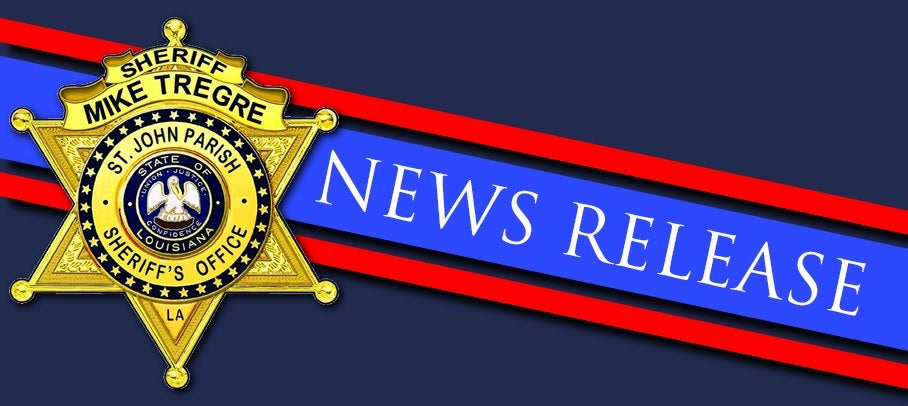St. John Government seeks flood protection funding through tax
Published 12:18 am Wednesday, April 5, 2017

- St. John the Baptist Parish Government is proposing a 7-mill, 30-year property tax that hits the ballot April 29 in hopes of funding a levee to create flood protection to prevent flooding, the likes of which is pictured during Hurricane Isaac.
(Editor’s note: This is the second in a series of two special editions detailing the 30-year, 7-mill property tax set for election April 29 and proposed to fund local levee development. April 1’s edition detailed the proposed levee.)
LAPLACE — It’s all going to flood protection.
St. John Government leaders are stressing to residents the money collected from this month’s proposed property tax is dedicated for flood protection.
Trending
Voters will get their say April 29 when the 7-mill, 30-year property tax hits the ballot.
Parish President Natalie Robottom said passing the tax creates the local cost-share of a massive levee protection system stretching from the Bonnet Carre Spillway in Montz to Hope Canal in Garyville. However, if the federal government fails to fund the effort, Robottom said the new tax money would still be used to build a locally sourced levee.

The Westshore Lake Pontchartrain Levee Project, as proposed, would cost $718 million, according to St. John the Baptist Parish Government, and include earthen levees, flood walls and pump stations. St. John officials say the local cost-share is $50 million, with annual maintenance costs of $5 million.
Robottom cites Terrebonne, Lafourche and St. Charles parishes as regional entities that created levees without federal assistance.
“We can’t just wait to flood again to get an appropriation from the federal government,” she said.
Late last year then-President Barack Obama signed the Water Infrastructure Improvements for the Nation Act into law that includes the Westshore Lake Pontchartrain Hurricane Risk Reduction Project, creating new levee protections for St. John the Baptist, St. Charles and St. James parishes. Congress and the U.S. Corps of Engineers still must create a spending vehicle to fund the majority portion of the massive project.
Robottom said passing this month’s property tax takes care of St. John’s portion of the $718 million project, which includes a federal cost-share of 65 percent and a non-federal cost-share of 35 percent.
Trending
“St. John is responsible for 20 percent of the non-federal cost-share for construction and an estimated $5 million annually for operation, maintenance, repair, replacement and rehabilitation of the levee, which is estimated to be $50 million,” Robottom said.
If approved, Parish officials say the tax would generate approximately $3 million in its first year and be first assessed on taxes collected in January 2018.
If the federal government fails to fund the effort, St. John Chief Financial Officer Ross Gonzales said the tax money could also be used for new or upgraded pump stations.
“If you don’t have good pumping stations, you can flood just from a normal rain,” Gonzales said. “It doesn’t have to be a hurricane. So there’s all sorts of things you can do. It would be a Plan B.”
Gonzales and Robottom said tax dollars would not be used for anything other than flood protection, stressing a “yes” vote this month dedicates the parish to specific spending restrictions.
Rollback & Rededication
During a recent Parish Council election forum, one candidate suggested St. John consider generating the local match by looking for potential mill rollbacks in existing taxes and funding 7 mills through a rededication vote and not a new tax vote.
Robottom acknowledged, should parish voters pass this month’s election, room for future rollbacks exist.
“We feel strongly that, within the next two to three years, we’ll be looking at our millages and, if possible, roll them back — whether we roll them fully back or partially,” Robottom said. “We don’t want to overtax anybody, but we also need to pay for the things and services that we provide. Part of that is making sure that we have a funding source, not just for the construction of this levee, but we have to maintain this levee for life.
“Maintaining it on a regular basis means cutting grass, fixing pumping stations and, periodically, we have to lift the levee because they sink. Initially, (the tax is for) construction dollars, then it’s for maintenance dollars.”
Federal funding & Planning
Local leaders tout U.S. Rep Garret Graves (R-Baton Rouge) as the region’s leading voice in Washington concerning federal approval.
Graves said Corps leaders and federal budgeting folks look positively upon places with a committed funding stream, adding a passage of this month’s property tax could help the effort get funded.
“That process will start unfolding with the budget that we’ll be working on in the coming weeks and months,” Graves said.
“We’re going to be working with the Corps of Engineers, because Congress does not earmark funding anymore. We’re going to be working with the Corps of Engineers to make sure this project is properly prioritized.”
Graves said it is his goal to see the project federally funded within 18 months but stressed Congress does not fund individual Corps projects but, in fact, allocates a lump sum of funding to the Corps of Engineers for their construction efforts and prioritization process.
According to Graves, the region’s federal disaster declaration following Hurricane Isaac bumped the project higher up the list.
“We finally got it authorized for construction last year but, again, that first dollar of construction funding is very tough to get,” he said.
If the tax passes, Robottom said Parish officials would meet with the Corps to make sure all paperwork is signed and find out what was needed for mitigating, land acquisition and surveying.
“We are going to start working with our dollars (right away,)” Robottom said.
“We don’t want to be the hold up on moving this project forward.”
Should voters fail to pass the tax this month, Robottom said Parish Government would regroup and ask again during a future election cycle.
— Staffers Lori Lyons and Stephen Hemelt contributed to this report.







